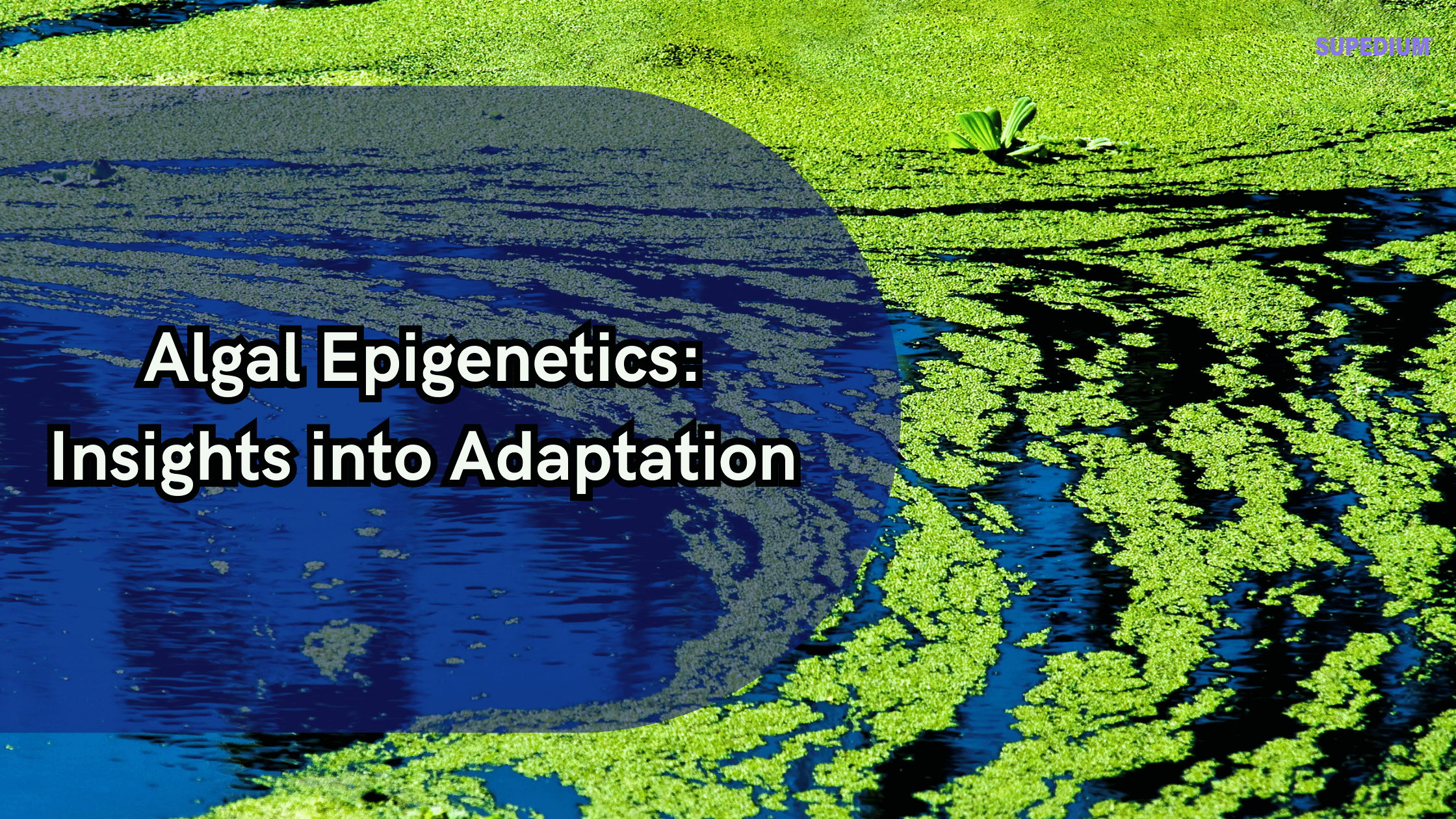Table of Contents
![]()
I. Introduction
Definition of Epigenetics
Epigenetics refers to the study of heritable changes in gene expression that do not involve alterations to the underlying DNA sequence. These changes can be influenced by various factors, including environmental conditions, and play a crucial role in regulating gene activity. In contrast to genetic mutations, which involve permanent changes to the DNA, epigenetic modifications are often reversible and can affect how cells respond to stimuli.
Relevance of Algal Studies
Algae are a diverse group of photosynthetic organisms that thrive in various aquatic environments, from freshwater lakes to the open ocean. They play an essential role in global ecosystems, contributing significantly to primary productivity and serving as the base of the food web. Understanding algal epigenetics is vital, as it provides insights into how these organisms adapt to changing environmental conditions.
Purpose of the Article
This article aims to explore how epigenetic mechanisms contribute to algal adaptation. By examining the role of epigenetics in algae, we can gain insights into their ecological significance and the potential implications for biotechnology and climate change mitigation.
II. Epigenetic Mechanisms in Algae
Overview of Epigenetic Modifications
Epigenetic modifications can occur through several mechanisms:
- DNA Methylation: The addition of a methyl group to DNA can suppress gene expression. In algae, DNA methylation is a key regulatory mechanism that helps them respond to environmental stressors.
- Histone Modification: Histones are proteins around which DNA is wrapped. Chemical modifications to histones can influence chromatin structure and gene accessibility, affecting gene expression patterns.
- Non-coding RNAs: These RNA molecules do not encode proteins but play roles in regulating gene expression and maintaining chromatin structure.
Specific Mechanisms in Algal Species
Different algal species exhibit unique epigenetic strategies. For instance, in Chlamydomonas reinhardtii, a green alga, researchers have identified specific patterns of DNA methylation and histone modifications that correlate with adaptive traits in response to light variations. Diatoms, another group of algae, demonstrate distinct epigenetic responses to nutrient availability, which can influence their growth and reproduction.
III. Environmental Factors Influencing Algal Epigenetics
Abiotic Stressors
Algae encounter various abiotic stressors in their environments:
- Light Intensity and Quality: Changes in light can trigger epigenetic modifications, influencing pigment production and photosynthetic efficiency.
- Temperature Fluctuations: Extreme temperatures can lead to stress responses mediated by epigenetic changes, allowing algae to adjust their metabolic pathways.
- Nutrient Availability: Limited nutrients can induce epigenetic modifications that optimize nutrient uptake and utilization.
Biotic Interactions
Interactions with other organisms also affect algal epigenetics:
- Competition and Predation: Algae may alter their gene expression profiles in response to competitive pressures or predation, facilitating survival and growth.
- Symbiosis and Mutualism: In symbiotic relationships, epigenetic changes can enhance cooperation between algae and their partners, such as corals or other microorganisms.
Impact of Climate Change
Climate change poses significant challenges to algal populations:
- Ocean Acidification: Increased carbon dioxide levels can affect the epigenetic regulation of algal growth and composition.
- Altered Salinity Levels: Changes in salinity can lead to epigenetic adaptations that enable algae to survive in fluctuating environments.
IV. Epigenetic Adaptation Mechanisms
Transgenerational Epigenetic Inheritance
Epigenetic changes can be inherited across generations, allowing algae to pass on adaptive traits. For example, when exposed to certain stressors, epigenetic modifications can become established in the genome, enhancing the survival of subsequent generations.
Phenotypic Plasticity
Epigenetics plays a critical role in phenotypic plasticity, where organisms exhibit a range of phenotypes in response to environmental changes. Algae can rapidly adjust their morphology, growth rate, and metabolic processes based on epigenetic signals, which can be crucial for survival in fluctuating conditions.
Epigenetic Memory
The concept of epigenetic memory refers to the ability of organisms to “remember” past environmental conditions. Algae can maintain epigenetic modifications over time, allowing them to respond more effectively to repeated stressors. This memory can enhance resilience and adaptability in changing environments.
V. Case Studies
Case Study 1: Green Algae (Chlamydomonas reinhardtii)
Chlamydomonas reinhardtii is a model organism for studying algal epigenetics. Research has shown that this green alga can adapt to varying light conditions through specific patterns of DNA methylation and histone modifications, influencing its photosynthetic efficiency and growth.
Case Study 2: Diatoms
Diatoms, a group of algae characterized by their silica cell walls, exhibit remarkable adaptability to nutrient stress. Epigenetic mechanisms enable diatoms to modify their cell wall composition in response to changing nutrient availability, affecting their ecological roles and interactions with other organisms.
Case Study 3: Cyanobacteria
Cyanobacteria, often considered blue-green algae, have demonstrated significant epigenetic responses to environmental changes. Studies show that these organisms can adapt their metabolic pathways through epigenetic modifications, offering insights into their potential use in biofuel production.
VI. Implications of Algal Epigenetics
Ecological Implications
Understanding algal epigenetics has important ecological implications. Epigenetic adaptations can influence algal blooms, nutrient cycling, and overall ecosystem dynamics. As algal responses to environmental changes become clearer, their roles in ecosystem resilience can be better understood.
Biotechnological Applications
The knowledge gained from algal epigenetics can be harnessed for biotechnological applications. Genetic engineering techniques informed by epigenetic research can enhance the production of biofuels, pharmaceuticals, and other valuable compounds derived from algae.
Climate Change Mitigation
Epigenetic insights can also contribute to climate change mitigation strategies. Engineered algae with enhanced adaptive capabilities may be able to thrive in changing environments, serving as valuable tools for carbon sequestration and ecosystem restoration.
VII. Future Directions and Research Needs
Gaps in Current Understanding
Despite progress in algal epigenetics, significant gaps remain. More comprehensive studies are needed to explore diverse algal species and their unique epigenetic mechanisms. Additionally, the interplay between genetic and epigenetic factors requires further investigation.
Technological Advancements
Advancements in sequencing technologies and bioinformatics offer exciting opportunities for high-throughput epigenetic studies. These tools can facilitate the exploration of complex epigenetic networks and their roles in algal adaptation.
Interdisciplinary Approaches
Future research would benefit from interdisciplinary collaboration among ecologists, geneticists, and climate scientists. Integrative frameworks can enhance our understanding of algal adaptation and resilience in the face of global change.
VIII. Conclusion
Summary of Key Insights
Algal epigenetics plays a crucial role in how these organisms adapt to their ever-changing environments. The mechanisms of epigenetic modification—such as DNA methylation and histone modification—are essential for understanding algal responses to stressors, competition, and climate change.
Call to Action
Continued research into algal epigenetics is imperative. As we deepen our understanding of these mechanisms, we can uncover new avenues for ecological management, biotechnology, and climate change adaptation. The study of algal epigenetics not only enhances our knowledge of these vital organisms but also provides critical insights for sustaining our planet’s ecosystems.
Share This





Be the first to comment